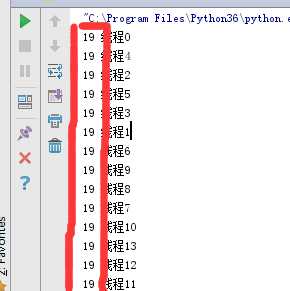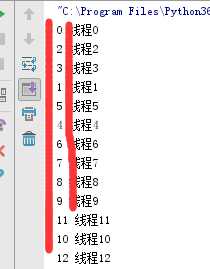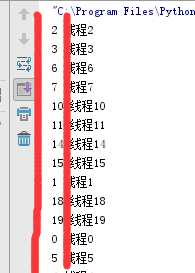标签:origin ide python self rom 循环引用 多个 image 全局变量
Flask如何使用上下文临时把某些对象变为全局可访问
情况一:单进程单线程
这种情况可以基于全局变量存储临时的对象
情况二:单进程多线程
这种情况会出现多个线程共享全局的变量,为了每个线程中的数据不被其他线程修改,可以借助hreading.local对象,为每个线程做唯一的表示用来做键,请求的对象作为值来实现
多线程共享数据的问题
import threading class Foo(object): def __init__(self): self.name = 0 local_values = Foo() def func(num): local_values.name = num import time time.sleep(1) print(local_values.name, threading.current_thread().name) for i in range(20): th = threading.Thread(target=func, args=(i,), name=‘线程%s‘ % i) th.start()
我们可以看到最后把每个线程中对象中name值都变为了19,不能保证每个线程中对象中的值唯一

使用hreading.local对象可以对每个线程做唯一的表示可以解决上述的问题
import threading local_values = threading.local() def func(num): local_values.name = num import time time.sleep(1) print(local_values.name, threading.current_thread().name) for i in range(20): th = threading.Thread(target=func, args=(i,), name=‘线程%s‘ % i) th.start()
可以看到每个线程中的值唯一

- 情况三:单进程单线程(多个协程)Flask 的上下文管理就是基于这种情况做的
在这种情况下使用上面的方法可以保证线程中的数据唯一,但是使用其内部创建多个协程后,hreading.local只能对线程作唯一的标示,协程是在单线程下切换的,所以多个协程还会出现共享数据的问题
解决的思路:为每个程做唯一的标示,我们可以通过python自带的greenlet模块中的getcurrent来实现
只需对上面的代码做简单的修改即可
import threading try: from greenlet import getcurrent as get_ident # 协程 except ImportError: try: from thread import get_ident except ImportError: from _thread import get_ident # 线程 class Local(object): def __init__(self): self.storage = {} self.get_ident = get_ident def set(self,k,v): ident = self.get_ident() origin = self.storage.get(ident) if not origin: origin = {k:v} else: origin[k] = v self.storage[ident] = origin def get(self,k): ident = self.get_ident() origin = self.storage.get(ident) if not origin: return None return origin.get(k,None) local_values = Local() def task(num): local_values.set(‘name‘,num) import time time.sleep(1) print(local_values.get(‘name‘), threading.current_thread().name) for i in range(20): th = threading.Thread(target=task, args=(i,),name=‘线程%s‘ % i) th.start()
测试的结果如下

使用面向对象中方法对其进行简单的优化
在初始化的时候设置属性的时候,为了避免循环引用,我们可以这样做 object.__setattr__(self, ‘storage‘, {})
class Foo(object): def __init__(self): object.__setattr__(self, ‘storage‘, {}) # self.storage = {} def __setattr__(self, key, value): self.storage = {‘k1‘:‘v1‘} print(key,value) def __getattr__(self, item): print(item) return ‘df‘ obj = Foo() # obj.x = 123 # 对象.xx
修改后的代码如下所示
import threading try: from greenlet import getcurrent as get_ident # 协程 except ImportError: try: from thread import get_ident except ImportError: from _thread import get_ident # 线程 class Local(object): def __init__(self): object.__setattr__(self, ‘__storage__‘, {}) object.__setattr__(self, ‘__ident_func__‘, get_ident) def __getattr__(self, name): try: return self.__storage__[self.__ident_func__()][name] except KeyError: raise AttributeError(name) def __setattr__(self, name, value): ident = self.__ident_func__() storage = self.__storage__ try: storage[ident][name] = value except KeyError: storage[ident] = {name: value} def __delattr__(self, name): try: del self.__storage__[self.__ident_func__()][name] except KeyError: raise AttributeError(name) local_values = Local() def task(num): local_values.name = num import time time.sleep(1) print(local_values.name, threading.current_thread().name) for i in range(20): th = threading.Thread(target=task, args=(i,),name=‘线程%s‘ % i) th.start()
标签:origin ide python self rom 循环引用 多个 image 全局变量
原文地址:https://www.cnblogs.com/crazymagic/p/9589351.html